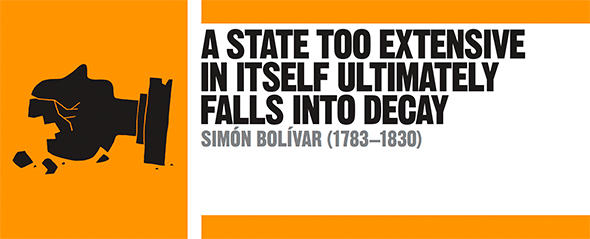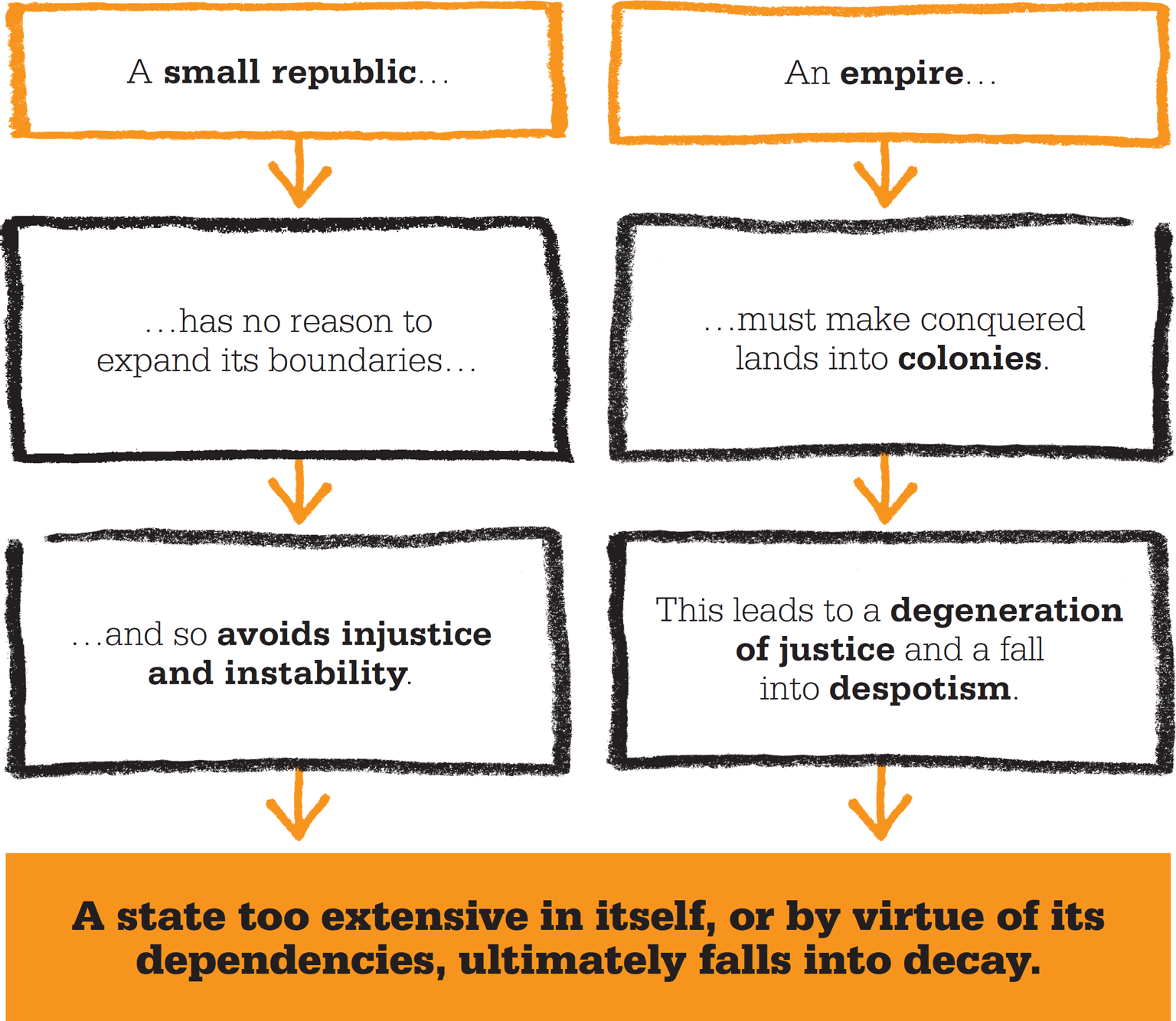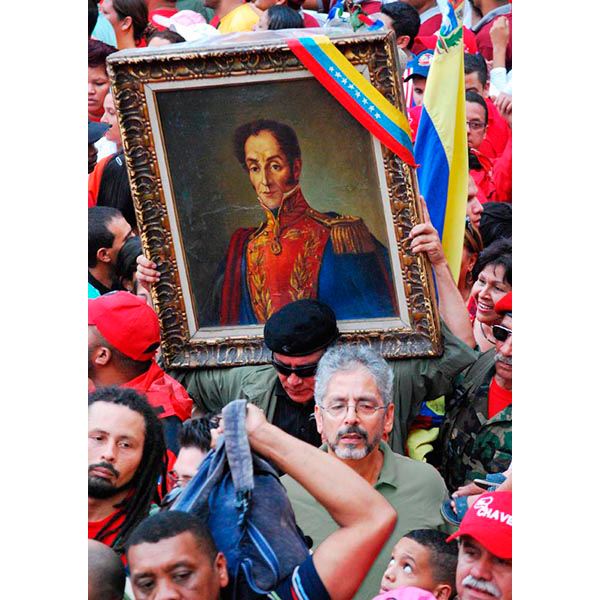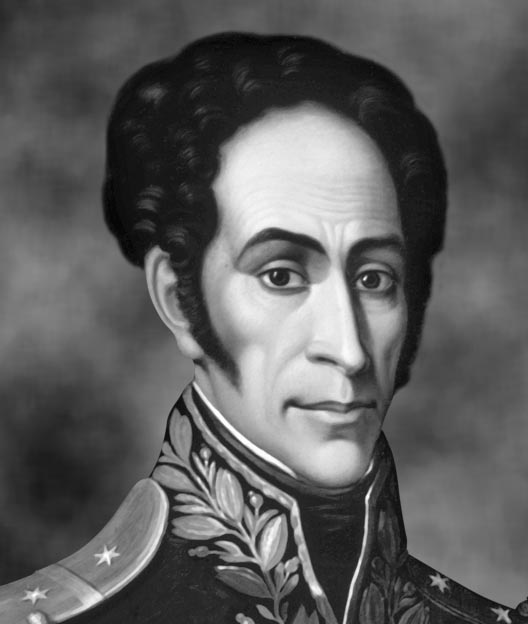
IN CONTEXT
Liberal republicanism
Revolutionary warfare
1494 In the Treaty of Tordesillas, the territories of the Americas are divided between Spain and Portugal.
1762 Jean-Jacques Rousseau argues against the divine right of kings to rule.
1918 Following World War I, President Woodrow Wilson lays out a reconstruction plan for Europe based on liberal nationalist principles.
1964 Che Guevara addresses the United Nations, arguing that Latin America has yet to gain true independence.
1999 Hugo Chavéz becomes president of Venezuela with a political ideology he describes as Bolivarian.
Christopher Columbus claimed America for Spain in 1492, paving the way for an empire that would extend over five continents. The Spanish would rely on the collaboration of local elites to manage their lands. Venezuelan revolutionary Simón Bolívar saw this aspect of their empire as a source of dynamism, but also as a potential weakness.

Small but strong republics
Spain’s power began to crumble in 1808 when Napoleon invaded and placed his brother on the throne. Bolívar recognized this as an opportunity for the Spanish American countries to throw off the yoke of colonialism. During an 18-year fight for freedom, Bolívar was exiled for a year in Jamaica. As he planned for the future, he pondered how he could ensure a state large enough to govern, but small enough to foster the greatest happiness for its people.
Bolívar considered the question in “The Jamaica Letter.” In this letter, he explained his reason for rejecting monarchies: kingdoms were inherently expansionist, driven by a king’s “constant desire to increase his possessions.” A republic, on the other hand, was “limited to the matter of its preservation, prosperity, and glory.”
"The distinctive feature of small republics is permanence."
Simón Bolívar
Bolívar believed that Spanish America should become 17 independent republics, and the ambition of these must be to educate; to help people in their fair ambitions; and to protect the rights of all citizens. Each would have no reason to expand its boundaries, because this used up valuable resources while bringing no advantages. In addition, “a state too extensive in itself, or by virtue of its dependencies, ultimately falls into decay.” Worse still, “its free government becomes a tyranny,” its founding principles are disregarded and it “degenerates into despotism.” Small republics, he said, enjoyed permanence; large ones veered towards empire and instability.

Bolivar’s portrait is held aloft during a pro-Hugo Chávez rally in Venezuela. Chávez describes his political movement as a Bolívarian revolution, stressing its anti-imperialist stance.
American republics
The independent republics that emerged in Spanish America after the wars of liberation reflected Bolívar’s vision in their size, if not in their freedoms, since political power came to be monopolized by small elites. In this, they perhaps reflected Bolívar’s own elitist instincts and ambivalence towards full democracy.
The revolutionary vision of “El Libertador” is still revered in Latin America, though Bolívar’s name has been misappropriated by politicians to sanction actions he would have deplored.
SIMÓN BOLÍVAR

Born to aristocratic parents in Venezuela, Simón Bolívar was tutored by renowned scholar Simón Rodríguez, who introduced him to the ideals of the European Enlightenment. At age 16, after completing his military training, Bolívar traveled through Mexico and France, then on to Spain, where he married, though his wife died eight months later.
In 1804, Bolívar witnessed Napoleon Bonaparte become emperor of France. He was inspired by the nationalist ideas he encountered in Europe and vowed not to rest until South America gained independence from Spain. Bolívar led the liberation of modern-day Ecuador, Colombia, Venezuela, Panama, northern Peru, and northwest Brazil from Spain. Retreating from his earlier idealism, Bolívar felt forced to declare himself dictator of the new state of Gran Colombia in 1828. He died two years later, disillusioned with the results of the revolutions he had inspired.
Key works
1812 The Cartagena Manifesto
1815 The Jamaica Letter
See also: Niccolò Machiavelli • Jean-Jacques Rousseau • Jeremy Bentham • Che Guevara
